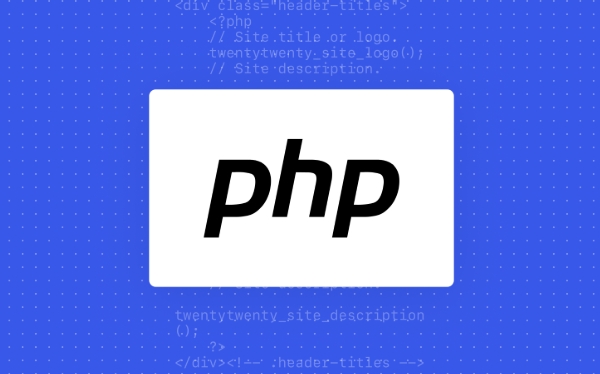 Backend Development
Backend Development
 PHP Tutorial
PHP Tutorial
 Unraveling the Mystery of $_REQUEST: When GET, POST, and COOKIE Collide
Unraveling the Mystery of $_REQUEST: When GET, POST, and COOKIE Collide
Unraveling the Mystery of $_REQUEST: When GET, POST, and COOKIE Collide
$_REQUEST merges GET, POST and COOKIE data, but there are security and predictability risks; when the key conflicts, its override order is determined by variables_order or request_order in php.ini, default is EGPCS, that is, POST override GET and GET override COOKIE; for example, when there are "user" parameters in GET, POST and COOKIE POST value wins; the use of $_REQUEST may lead to security vulnerabilities, unpredictable behavior and difficulty in testing; the best practice is to avoid using $_REQUEST, but should explicitly use $_GET, $_POST or $_COOKIE; it is only used in general filtering, security frameworks or prototype development that are independent of input source; in short, because its behavior depends on configuration and is prone to abuse, specific hyperglobal variables should be preferred to ensure clear and secure code.

When working with PHP, you've likely come across $_GET , $_POST , and $_COOKIE —superglobals that store data from different sources. But there's another one that often raises eyesbrows: $_REQUEST . It's a convenient shortcut, but it can also introduce subtle bugs if you don't understand how it works. Let's break down what $_REQUEST really is, how it behaves when GET, POST, and COOKIE data colleague, and why you should think twice before using it.

What Is $_REQUEST ?
$_REQUEST is a PHP superglobal that, by default, contains the contents of $_GET , $_POST , and $_COOKIE . It's a merged array allowing you to access request data without knowing the method or source upfront.
For example:

// If you send a GET request: ?name=John echo $_REQUEST['name']; // Outputs: John // Or submit a form via POST with name=Jane echo $_REQUEST['name']; // Outputs: Jane // Or if a cookie named 'name' exists echo $_REQUEST['name']; // Outputs the cookie value
This seems handy—no need to check which method was used. But convenience comes at a cost.
How Does $_REQUEST Handle Conflicts?
When the same key exists in more than one of $_GET , $_POST , or $_COOKIE , PHP doesn't merge them—it overwrites them based on a predefined order. This order is controlled by the variables_order or request_order directives in php.ini .

By default, most PHP installations use:
variables_order = "EGPCS"
Which stands for:
- E → Environment variables
- G → GET
- P → POST
- C → Cookies
- S → Server variables
So when $_REQUEST is popular, values are merged in that order, with later entries overwriting earlier ones.
But here's the catch: $_REQUEST only includes G, P, and C by default, and the priority order is actually determined by the sequence in request_order . If not set, it follows variables_order , and typically, POST takes precedence over GET, which takes precedence over COOKIE .
For example:
// Request: ?user=admin // POST data: user=hacker // Cookie: user=guest echo $_REQUEST['user']; // Outputs: hacker (POST wins)
This means an attacker could potentially override URL parameters (GET) by including the same parameter in POST—even if your logic assumes the value comes from the query string.
Security and Predictability Risks
Using $_REQUEST can lead to:
- Security vulnerabilities : If you're checking a token in GET but allow it to be overridden via POST or cookies, you might weaken CSRF protections.
- Unpredictable behavior : The same script might behave differently based on how data is sent, making bugs hard to trace.
- Testing complexity : Mocking requests become harder when multiple input sources affect the same variable.
For instance, imagine this code:
if ($_REQUEST['action'] === 'delete') {
deleteAccount();
}An attacker could:
- Send a POST request with
action=delete, even if the link was meant to be GET-only. - Set a malicious cookie that triggers the action unexpectedly.
Best Practices: When (and When Not) to Use $_REQUEST
In most cases, avoid $_REQUEST . Instead:
- Use
$_GETwhen expecting URL parameters. - Use
$_POSTfor form submissions. - Use
$_COOKIEonly when explicitly dealing with cookies.
This makes your code more secure and easier to audit.
However, $_REQUEST might be acceptable in limited scenarios:
- Generic input filters where source doesn't matter (eg, logging all input).
- Frameworks or routers that abstract input handling safely.
- Quick prototypes (but remove it before production).
Even then, explicitly checking each source gives you more control.
Bottom Line
$_REQUEST is like a magic box that combines inputs—but the box has rules you can't always see. When GET, POST, and COOKIE colleague, the winner depends on PHP's internal configuration, not your intent. That unpredictability is dangerous.
Stick to the specific superglobals. Know your data source. Write clearer, safer code.
Basically: just because you can use $_REQUEST , doesn't mean you should .
The above is the detailed content of Unraveling the Mystery of $_REQUEST: When GET, POST, and COOKIE Collide. For more information, please follow other related articles on the PHP Chinese website!

Hot AI Tools

Undress AI Tool
Undress images for free

Undresser.AI Undress
AI-powered app for creating realistic nude photos

AI Clothes Remover
Online AI tool for removing clothes from photos.

Clothoff.io
AI clothes remover

Video Face Swap
Swap faces in any video effortlessly with our completely free AI face swap tool!

Hot Article

Hot Tools

Notepad++7.3.1
Easy-to-use and free code editor

SublimeText3 Chinese version
Chinese version, very easy to use

Zend Studio 13.0.1
Powerful PHP integrated development environment

Dreamweaver CS6
Visual web development tools

SublimeText3 Mac version
God-level code editing software (SublimeText3)
 Beyond Sanitization: The Fundamental Problem with $_REQUEST's Data Ambiguity
Aug 03, 2025 am 04:23 AM
Beyond Sanitization: The Fundamental Problem with $_REQUEST's Data Ambiguity
Aug 03, 2025 am 04:23 AM
Using$_REQUESTintroducesdataambiguitybymerginginputsfrom$_GET,$_POST,and$_COOKIE,makingitimpossibletodeterminethesourceofdata.2.Thisunpredictabilityweakenssecuritybecausedifferentsourceshavedifferenttrustlevelsandattackvectors,suchasCSRFviaGETorsessi
 The Inherent Security Risks of Using PHP's $_REQUEST Superglobal
Aug 02, 2025 am 01:30 AM
The Inherent Security Risks of Using PHP's $_REQUEST Superglobal
Aug 02, 2025 am 01:30 AM
UsingPHP’s$_REQUESTsuperglobalintroducessecurityrisksbecauseitcombinesinputfrom$_GET,$_POST,and$_COOKIE,leadingtounpredictablebehavior;2.Itallowsunintendedinputsourcestooverrideintendedones,suchasamaliciouscookietriggeringadeleteactionmeanttocomefrom
 Deconstructing the Dangers: Why Modern PHP Developers Avoid $_REQUEST
Aug 02, 2025 pm 03:10 PM
Deconstructing the Dangers: Why Modern PHP Developers Avoid $_REQUEST
Aug 02, 2025 pm 03:10 PM
$_REQUESTisdiscouragedinmodernPHPbecauseitmergesinputfrom$_GET,$_POST,and$_COOKIE,creatingsourceambiguitythatunderminessecurityandpredictability.2.Thisambiguityenablesattackssuchascookietampering,requestmethodconfusion,andCSRFbypass,asseenwhenamalici
 From $_REQUEST to Request Objects: The Evolution of Input Handling in Modern Frameworks
Aug 06, 2025 am 06:37 AM
From $_REQUEST to Request Objects: The Evolution of Input Handling in Modern Frameworks
Aug 06, 2025 am 06:37 AM
Theshiftfrom$_REQUESTtorequestobjectsrepresentsamajorimprovementinPHPdevelopment.1.Requestobjectsabstractsuperglobalsintoaclean,consistentAPI,eliminatingambiguityaboutinputsources.2.Theyenhancesecuritybyenablingbuilt-infiltering,sanitization,andvalid
 Unraveling the Mystery of $_REQUEST: When GET, POST, and COOKIE Collide
Aug 06, 2025 am 08:06 AM
Unraveling the Mystery of $_REQUEST: When GET, POST, and COOKIE Collide
Aug 06, 2025 am 08:06 AM
$_REQUEST merges GET, POST and COOKIE data, but there are security and predictability risks; when the key conflicts, its override order is determined by variables_order or request_order in php.ini, and defaults to EGPCS, that is, POST overwrites GET and GET overwrites COOKIE; for example, when there are "user" parameters in GET, POST and COOKIE, the POST value wins; using $_REQUEST may lead to security vulnerabilities, unpredictable behavior and difficulty in testing; the best practice is to avoid using $_REQUEST, but should explicitly use $_GET, $_POST or $_C
 A Deep Dive into $_REQUEST vs. $_POST vs. $_GET: Understanding Precedence and Pitfalls
Aug 06, 2025 pm 05:42 PM
A Deep Dive into $_REQUEST vs. $_POST vs. $_GET: Understanding Precedence and Pitfalls
Aug 06, 2025 pm 05:42 PM
Avoidusing$_REQUESTduetounpredictabledatasourceandsecurityrisks;2.Use$_GETforidempotentoperationslikefiltering,$_POSTforstate-changingactionslikeformsubmission;3.Thevaluein$_REQUESTdependsonrequest_orderinphp.ini,leadingtoinconsistentbehavior;4.$_REQ
 Mastering Input Control: How `request_order` in php.ini Dictates $_REQUEST Behavior
Aug 08, 2025 pm 06:02 PM
Mastering Input Control: How `request_order` in php.ini Dictates $_REQUEST Behavior
Aug 08, 2025 pm 06:02 PM
Therequest_orderdirectiveinphp.inidetermineswhichdatasources(GET,POST,COOKIE)aremergedinto$_REQUESTandtheirprecedenceorder;forexample,request_order="GP"means$_REQUESTincludesonlyGETandPOSTdata,withPOSToverridingGETwhenkeysconflict;understan
 Securing Your Application: Why Explicit $_GET and $_POST are Superior to $_REQUEST
Aug 08, 2025 pm 05:18 PM
Securing Your Application: Why Explicit $_GET and $_POST are Superior to $_REQUEST
Aug 08, 2025 pm 05:18 PM
Using$_GETand$_POSTinsteadof$_REQUESTismoresecurebecauseitensurespredictableinputsources,2.ItpreventsparameterconflictsduetooverlappingnamesinGET,POST,andCOOKIE,3.ItstrengthensdefensesagainstCSRFbyenforcingrequestmethodintegrity,4.Itimprovescodeclari






